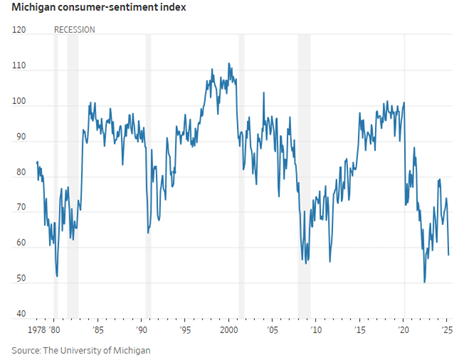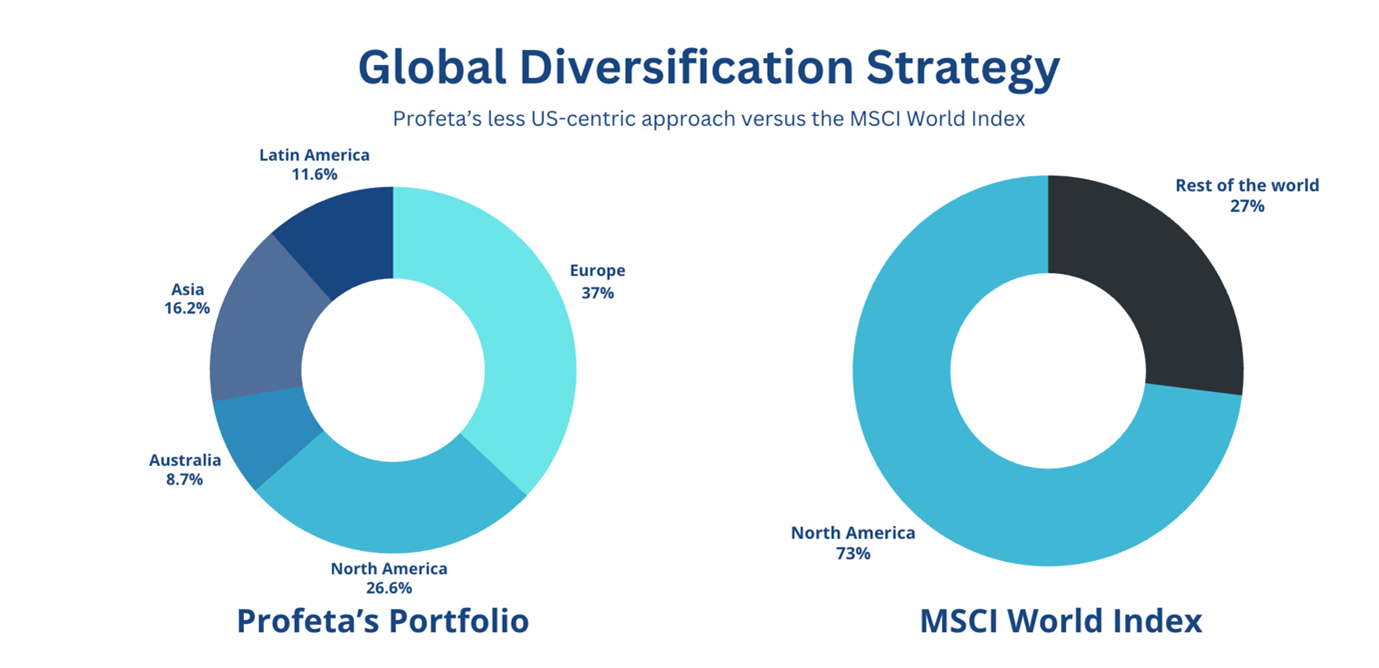How to position yourself against Trump’s tariffs
When Trump was inaugurated in January, markets were not bracing for wide-spread tariffs on most imports into the United States.
Initially, Trump levied two rounds of 10% tariffs on China and 25% tariffs on imported cars and certain auto parts. He has also imposed 25% tariffs on steel and aluminium imports, and 25% on imports from Mexico and Canada that aren’t covered by an existing trade agreement. On April 3, he announced sweeping broad tariffs on most of the US’s trading partners.
The reciprocal tariffs he announced on each country can be seen in the table below.

Although Trump inherited an economy with steady growth, there are still vulnerabilities. This includes the frozen housing sector, cooling labour market, richly valued stock market, and the aftereffects of several years of high prices. The culmination of these factors and his tariffs led to a significant impact on consumer sentiment, which started to impact results from consumer discretionary companies.
While tariffs are theoretically a tax on imported goods, what really happens is that foreign companies raise the prices of their goods in the United States and the consumer ends up paying a higher price. If those foreign goods are a BMW or French camembert or champagne and the US consumer sees those goods as superior to their local alternative, they will keep buying them but end up with less savings or money to spend elsewhere.
Tariffs don’t directly impact foreign companies if they produce a superior product and if they improve their productivity and cost base. Tariffs are a tax on the US consumer. We expect the US economy to fall into a recession this year unless the Trump administration winds back some of the announced tariffs.
Current falls in stock markets reflect a weakening global economy as well a price correction in some over valued parts of the market.
The US economy was weakening and stocks started declining in the March Quarter.
The University of Michigan on Friday reported that its index of consumer sentiment, which measures people’s view of the economy, fell to 57 this month from 64.7 in February, hitting its lowest level since 2022.

Retail companies delivered weaker-than-expected earnings and guidance during the March quarter. Nike delivered a 9% decline in sales and guided for “mid-teens” decline in sales for the May quarter. While Abercrombie and Fitch delivered 9% growth in their sales for the quarter, they said that current sales are trending “a bit negative” during the current quarter.
Weaker consumer confidence and the LA fires caused airline companies to downgrade their revenue and earnings expectations for the coming quarter. Delta downgraded their revenue growth guidance from 7-9% to 3-4%.
The March ISM manufacturing index came in at 49, down from 50.3 in February. This indicates a deceleration in the manufacturing sector. Federal Express cut its EPS guide for the third consecutive quarter, and suggested weakness in the industrial economy via demand uncertainty.
While technology companies mostly met expectations, even strong growth from companies was not enough to offset their high valuations and high expectations.
Nvidia dropped 19% despite 4Q24 beating expectations and providing positive guidance. Alphabet (GOOG) and Microsoft also fell 18% and 11% respectively, with double-digit revenue and earnings growth not enough to outweigh sentiment of slowing cloud growth. Companies like Tesla started to fall back to earth, dropping 34%, even though it still trades on a PE of 96x!
Our stance
Our position against Trump’s tariffs is working well.
Profeta's funds are weathering the storm well given our diversified portfolio of quality businesses around the world. We were pleased to see our Brazilian stocks rising on April 3rd, as well as some of our defensive stocks in Europe like Nomad Foods, Euronext and Grifols.
During the March quarter, our fund appreciated 3%. This is in stark contrast to the US’s S&P500 which declined 4.6%, MSCI World index which was down 2% and Australia’s All Ordinaries, which declined 4.4%.
We do not expect our companies to be overly impacted by Trump’s tariffs.

77% of our portfolio is outside of the United States and our companies are leaders or emerging leaders in their domestic industries rather than being exporters into the United States.
We are well diversified with 32% of our portfolio in Europe, 23% in North America, 7.5% in Australia, 14% in Asia and 10% in Latin America. The MSCI World index, by contrast has basically turned into a US index with 73% of that benchmark exposed to the United States.
This calendar year (as of the 6th of April), the US’s S&P 500 index is down 14% and the MSCI World Index is down 10.3% and Australia’s All Ordinaries is down 7%. The Australian dollar is down 2.4% versus the US dollar.

By contrast, our fund is flat. Our YTD is currently 0%, much better than most global markets. This should give investors confidence that we are managing our portfolio prudently. We increased our cash levels, days before Trump’s “Liberation day”. We are not exposed to the overvalued areas of markets.
While a weakening US economy will lead to less external demand for imports, we expect lower interest rates and loosening monetary policy to support domestic economies around the world. We also watch each country’s fiscal policy to see whether they are supporting their economies or tightening policy.
The United States government has issues with budget deficits, trade deficits and rising government debt. But this is not the case for many other countries around the world.
Our fund is highly uncorrelated to major indices due to our concentrated positions in smaller capitalised companies around the world. We also like to invest in businesses that are not cyclical in nature and tend to do well during either weak or strong economies.
Our largest positions like Euronext and Nomad Foods will grow earnings irrespective of what happens in the global economy this year and their share prices have been rewarded this year for that reason.
While we think there are overinflated valuations in some of the largest companies in the world, any correction in these securities and indices should not really impact our portfolio of quality, growing companies, trading at attractive valuations.
Valuations around the world
The US market trades at a 60% relative premium valuation to the rest of the world. The past quarter saw some rotation out of the US into undervalued markets in Asia, Europe and Latin America.
We expect this trend to continue for a while as the disparity between the price of a quality company in those regions compared to the United States is still quite extreme. You can see the difference between the United States and Brazil in the charts below.


2 topics
6 stocks mentioned
